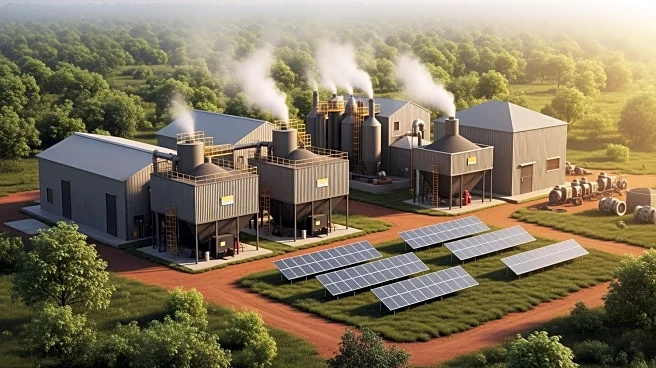What's Happening?
Altitude, a carbon removal financier, has announced a new offtake of 120,000 tons of Carbon Removal Certificates (CORCs) from biochar-based facilities in West Africa. This expansion builds on an earlier
commitment of 25,000 tons in the region. The projects are verified under the Puro.earth standard, emphasizing the bankability of durable carbon removal. West Africa offers ideal conditions for biochar CDR due to its agricultural residues, available land, and demand for sustainable soil amendments. Altitude aims to accelerate carbon removal at scale, targeting 1.5 million tons within a year.
Why It's Important?
Altitude's expansion in West Africa highlights the growing focus on carbon removal as a key strategy in combating climate change. Biochar CDR offers a sustainable solution by locking carbon into a stable form, contributing to soil improvement and waste reduction. The initiative supports regional employment and economic development, showcasing the potential for carbon removal projects to deliver local co-benefits. As carbon removal matures, investment-grade agreements like Altitude's signal confidence in the sector's scalability and impact. The development underscores the importance of innovative solutions in achieving global climate goals.
What's Next?
Altitude's commitment to carbon removal is expected to drive further investment in biochar facilities and similar projects. The focus on developing markets with abundant biomass feedstock suggests potential for expansion in other regions. The success of these initiatives could influence policy decisions and industry practices, encouraging more stakeholders to invest in carbon removal technologies. As Altitude targets 1.5 million tons of carbon removals within a year, the company will likely continue to explore opportunities for scaling its efforts globally.
Beyond the Headlines
The expansion of biochar facilities in West Africa highlights the intersection of climate action and economic development. The projects demonstrate how carbon removal can deliver environmental and social benefits, supporting sustainable agriculture and regional employment. The initiative reflects the broader trend of integrating climate solutions with local development goals, emphasizing the importance of holistic approaches in addressing climate change.









